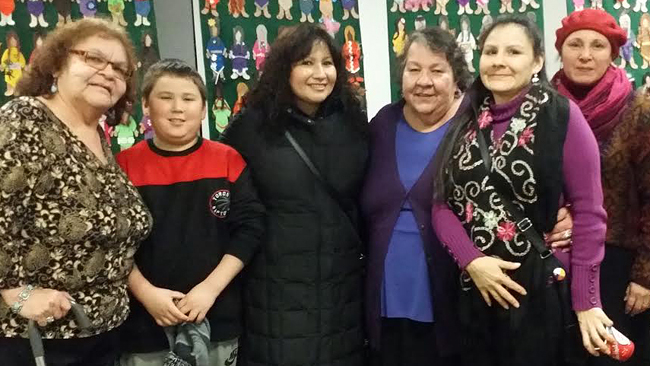Ryerson holds ceremony and feast to honour the missing and murdered

By Barb Nahwegahbow
A ceremony and feast has been held at Ryerson University, to honour Missing and Murdered Indigenous Women, Girls and Men, and all the Children who died at residential schools.
Joanne Dallaire, a Cree Omushkego elder, led the ceremony on February 16. It was attended by over 200 people. Dallaire has been an elder with Ryerson for the past ten years.
“This ceremony is to bring us together as a community,” said Dallaire, “and to remind us that men and women have a role in the healing of the community. It’s to make the community stronger and more responsible for our own healing.”
Members of the Toronto indigenous community sat in the healing circle with Ryerson students, faculty and staff. Tracey King, citizen of Wasauksing First Nation and Ryerson’s Aboriginal Human Resources Consultant said, “It was heartwarming to have so many people come out to honour the missing and murdered women and men.” It’s the first such ceremony that Ryerson has held.
A candle was lit at the centre of the circle to represent the protection and healing of the sacred fire. Dallaire explained, “This is a learning opportunity. Truth and reconciliation is about relationship between Indigenous and non-Indigenous people. It’s about relationship between ourselves and with ourselves. It’s about a different way of looking at each other. We all have the ability to assist each other in healing and feeling strong.”
Cedar tea was given to ceremony participants. Dallaire spoke about the use of cedar as a trauma medicine. “It rinses away the trauma.
Newborn babies are bathed in cedar to remove the trauma of birth. And when someone dies, they are given a cedar bath to remove the trauma of death. I can’t think of anyone who hasn’t been touched by this issue.
The men in our community are actively starting to take on a healing role and being responsible for themselves. I really wanted to acknowledge that.”
Following the ceremony, Sam Kloestra expressed his gratitude for the honouring of Indigenous men. “We recently lost two Indigenous male youth in Toronto.” Kloestra said one youth had been a very good friend of his, Kiowa Wind McComb. “I think it’s very important to recognize that while missing and murdered Indigenous women may have different systemic issues, the loss that we feel in the community is the same.”
After the healing song by Eagle Woman Singerz, Mag Cywink who is a citizen of Whitefish River First Nation stood up and said she takes every opportunity to make people understand that this is a global problem. “We’re not unique. We’re not isolated.”
“Coming together like this in circles and being able to voice our concerns and opinions and to get some understanding about why this is happening is very important to start the healing process for all of our families.” Cywink said her concept of justice has changed.
“Justice doesn’t always happen in this world. Justice is being able to talk to you, to attend vigils, go to feasts, honour the MMIWG, and to honour families.”
A film about her sister entitled, The Memory Project: Sonya Cywink has been made by Ryerson film students. “It was a great honour to see her life in a positive way. It’s not always the most favourable story that comes out about our family members.”
Sonya Cywink was murdered in 1994. Her murder remains unsolved. The film is available for viewing on You Tube.


